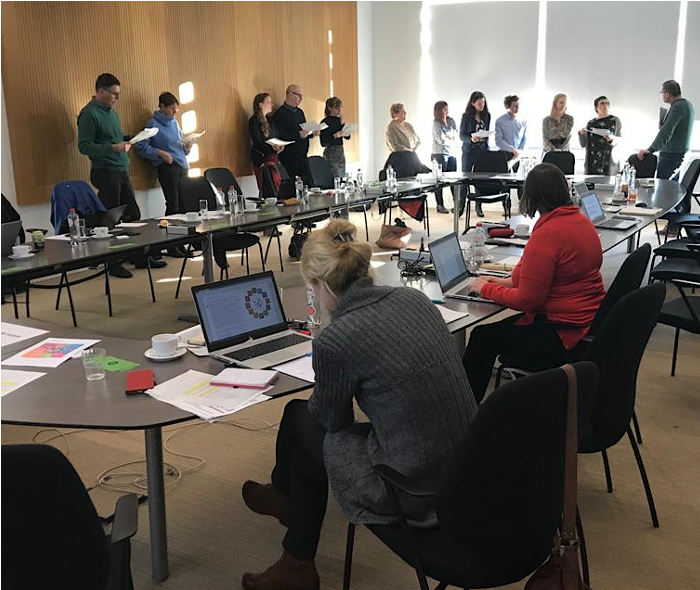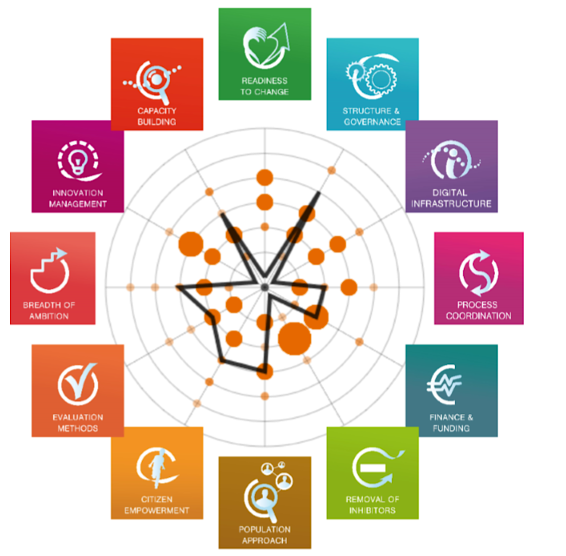Maturity Assessment Process - Flanders
The organisations responsible for the self-assessment process are:
- Flanders Agency for Care and Health
- Flemish Institute of Primary Care
The region
The Flanders region of Belgium has a population of 6.55 million people. The Belgium healthcare system covers public and private sectors, with fees payable in both, funded by a combination of social security contributions and health insurance funds. Flanders adds a Flemish Social Protection layer (FSP) organised separately from, and parallel to, the health insurance system.
This assessment is part of the larger implementation in the 60 Primary Care Boards of Flanders. Therefore, 12 out of the 15 members of the Board of the Flanders Primary Care Institute VIVEL participated.
Since 2014, Flanders has been engaged in the reform of primary care (integrating health and social care), mental health care, hospital care (strategic care planning) and rehabilitation. Flanders opts for a comprehensive approach to the reform of health and social care. The Primary Care Boards are closest to citizens with care needs and are supported by their Regional Care Platform and the Flemish Institute of Primary Care.
Research and innovation are expected to bring novel digital and technological solutions. In this respect,
- a Digital Care and Support Plan (DZOP) for a person with a care need will be instrumental while partnering with industry.
- Other policy measures include: a Flemish Social Protection Plan covering the non-medical costs;
- an integration of primary, secondary and specialised care; home and informal care;
- and, a continued focus on prevention and public health.
The Flanders Institute for Primary Care, VIVEL, was established in May 2019. Its role is to support for the Regional Care Platforms and the 60 Primary Care (PC) Boards, the latter representing 75.000 up to 125.000 inhabitants. It is expected to have the Boards’ fully operational in the second half of 2021. Their role is to strengthen collaboration and coordination between local authorities, primary (health and wellbeing) care professionals, associations of people with a need of care and support, associations of informal carers and volunteers.
Maturity Assessment for Integrated Care
The maturity assessment process comprised two separate stages:
a) individual self-assessments, completed by each of the stakeholders separately or within their organisation; and
b) face-to-face workshop with an objective to reach the consensus among all participating stakeholders on the final level maturity.
During this process it was clear that, while there is a significant journey still for integrated services in Flanders, the local health and social care professionals are aware of and keen to take on this challenge.

At the level of the organisations: many of them are moving into working together (health and social care). The level of enthusiasm of the participants in the discussion was clear, as was their eagerness to combine both health and social care.
Strengths identified through the Maturity Assessment process
- Looking at the overall consensus diagram, the dimension of “Readiness to change”, “Innovation Management” and “Structure and Governance” (after consensus) reached the best score.
Weaknesses identified through the Maturity Assessment process
- There are no dimensions where the maturity was fully reached and there is definitely a need for further improvement. Process Coordination, Evaluation methods and financing were identified as areas needing significant improvement. The role of umbrella organisations, and the recently started Primary Care Boards, will be necessary to support this process.
The experience of using the tool in Flanders has identified that, the Tool can be used as a means for future task division or to unfold ‘blind spots’:
•To get a comprehensive view of which elements of integrated care are still missing in Flanders' region;
•To provide an inspiration for the policy plan of VIVEL;
•As a means for the different organisations to identify where they can improve the reform process towards person centered care;
•The results give a basis for VIVEL to exchange good practices with other countries and regions as well as internally within Flanders and Belgium;
•The Tool is an opportunity to assist in capacity building at regional level to get people motivated.
The next step is to fine tune the Dimensions to the local Flanders situation. The following would be to implement the Maturity Model on a voluntary basis in the 60 Primary Care Boards in Flanders.
The team from Flanders took part in one of our knowledge exchange webinars. They shared further insights about the process. To view the webinar, follow this link.

The spider diagram illustrates the outcomes of the final consensus on the maturity for integrated care in Flanders.
The final report which will provide much more detailed information about the region and the process is available to download in the Maturity Assessment Reports section in Resources.


The project SCIROCCO Exchange is co-funded by the Health Programme of the European Union under Grant Agreement 826676 (Chafea)


